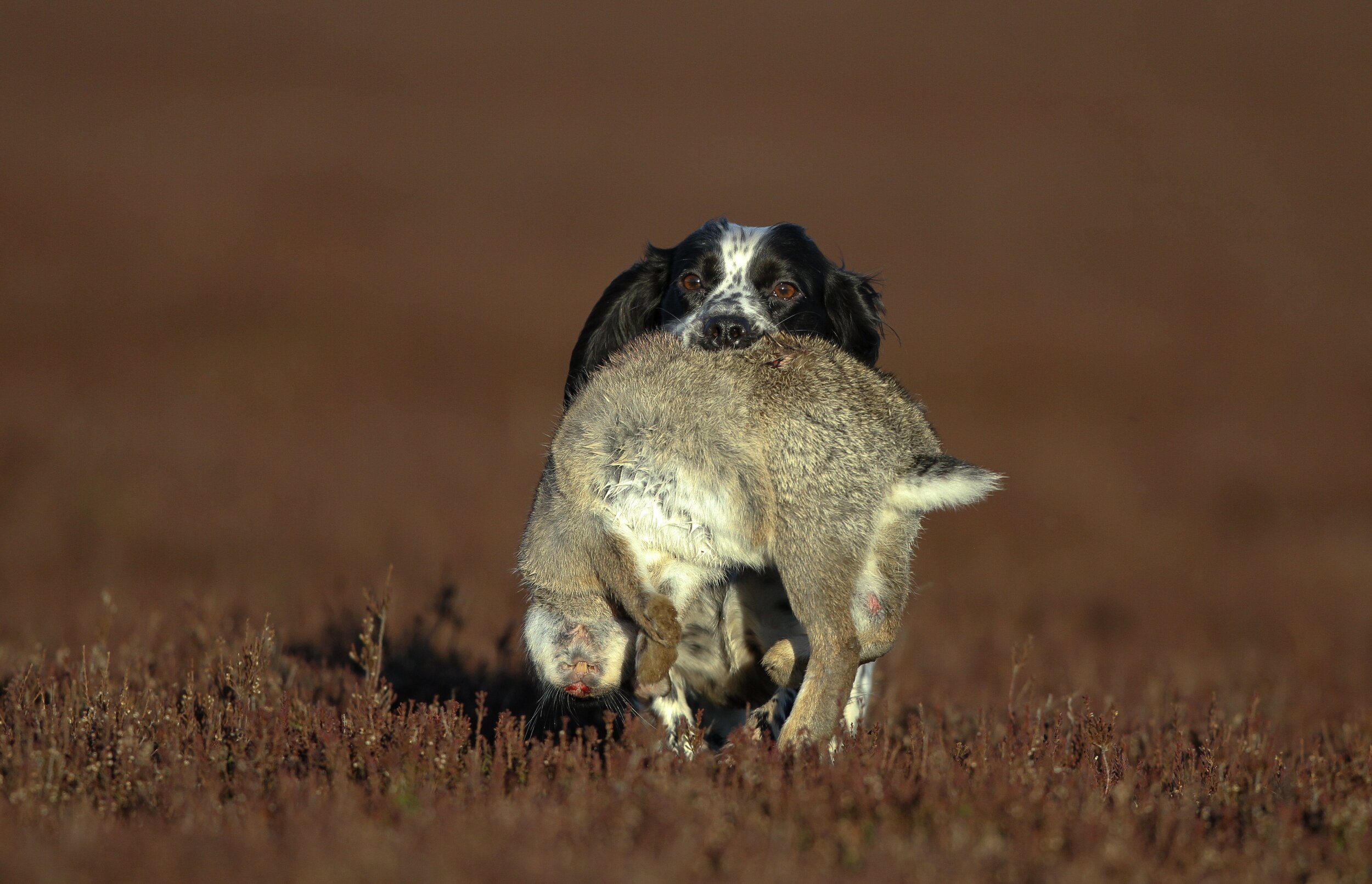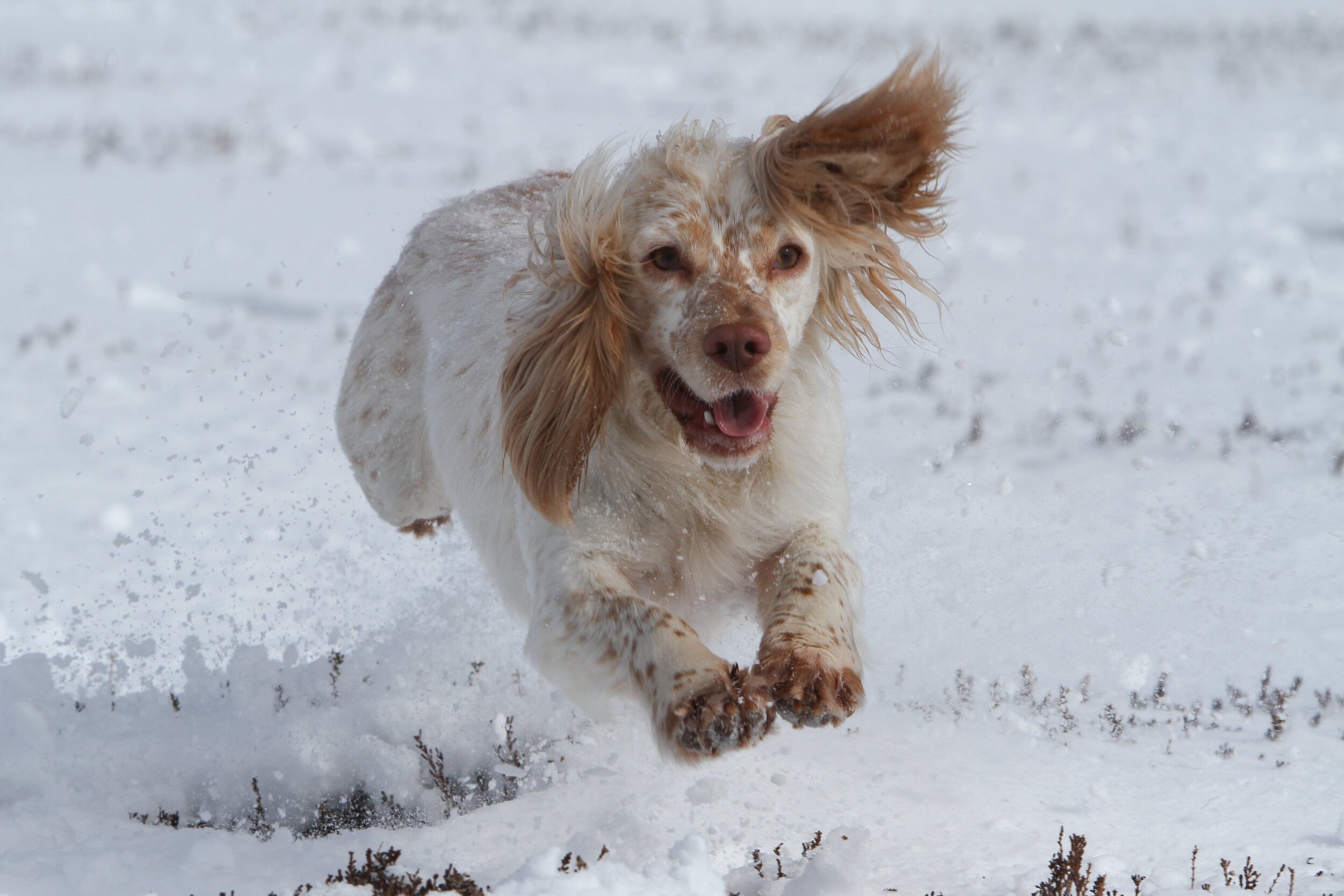Is a cocker right for you?
Over 20 years ago a moorland keeper who was a friend of ours acquired a small, solid liver cocker dog that was almost inevitably named Bisto. In those days cockers were fairly uncommon and he suffered numerous comments about what on earth he intended to do with it. By the time his wife got a very attractive blue roan bitch, most of the hardened dog men in the area had a begrudging respect for the small liver dog that worked tirelessly all day on pheasants and grouse. We too were converted and not long afterwards got a half sister of the aforementioned bitch. Her name was Beinnmhor Jessica and in turn a daughter of hers Wintergill Calypso was our first Field Trial Champion.
In those days cockers were very much in the minority on shoots. There were a number of dedicated people who pursued sensible breeding policies and always had the best interests of the breed at heart. Most of them were very aware that in most cocker pedigrees there lurked illicit setter, pointer and springer blood, but they were always careful to try and promote traditional cocker types and traits. Field trials for cockers were generally very good-humoured affairs, most of the handlers realised that their paragon of virtue was just as likely to commit a heinous crime the next day and took their triumphs and disasters in the same sportsmanlike manner.
Things have really changed, cockers seem to be everywhere and trials are very serious affairs. Some of the sportsmanship has gone out of them and most trials are heavily oversubscribed. Cockers are now very common on shoots throughout the country and are still increasing in popularity. Numerous litters of varying types are advertised frequently. Now to the question as to whether a cocker would be the dog for you.
In the main they are, without doubt, delightful dogs, friendly and people orientated they thrive in a family environment. Not needing huge amounts of exercise, they will fit into most routines but they do need stimulation and company, be it human or canine. They do not do well when left on their own for long periods and are often unhappy in a kennel on their own. You may well hear that you cannot have a good working dog living in the house – personally we think that is rubbish. Our first Field Trial Champion never spent a day in the kennel in her life. Many very good and successful dogs live in the house, and generally cockers do very well as pets/working dogs in a family environment. Practically, they do not take up a huge amount of room in the house or vehicle and are generally healthy.
Cockers do not take kindly to harsh treatment or handling and, as a rule, they are pretty biddable. As far as their working ability is concerned, we are obviously biased but think they take a lot of beating in most modern shooting disciplines. Whilst there are exceptions, they do not make great wildfowling dogs due to their size and the lack of waterproof qualities in their coats. Some of them can be unsuitable as peg dogs on large driven shoot but this is often due to upbringing and sometimes bloodlines rather than a problem with the breed. They do make great beating, picking up and general shooting dogs on grouse, pheasant and partridge shoots and excel on woodcock which is, after all, what they were bred for. If you are looking for a good all-round dog that is great company and fun to have around, a cocker would be hard to beat.
They have had a reputation as being difficult to train but this is often not the case now; as I said earlier, they do not take kindly to harsh treatment and why should they? Some of them can be easy to fall out with and can hold a grudge if they think they have been wronged but generally cockers are forgiving and friendly dogs. It is important to consider what sort of shooting you want the dog for before you start looking. If you are looking for an all-round dog that will spend some time on the peg, some time picking up and some time rough shooting, you may not want a pup whose pedigree bristles with Field Trial Champions.
Conversely, if you intend to trial, it is a good idea to have winners and champions in the pedigree. This is not a pre-requisite for success, but it is a good starting place. I would look for a dog whose ancestors have had some success in trials but also works on normal shoot days. A lot of writers have said that a trialling dog is just a highly-polished shooting dog, which isn’t strictly true. Quite a few people who trial are not even aware what is required on a shoot day, but they are happy to sell their rejects to shooting people. Conversely, many shooting people have never been to a trial let alone be aware what is required in a trialling dog but try to get a pup with as many champions in the pedigree as possible. My advice would be to spend some time looking at different dogs and what they do and possibly more importantly, what their owners do with them.
Once you have got your cocker the question of training will eventually arise. I would always encourage people to train their dogs themselves if at all possible. You will get a huge amount of enjoyment and satisfaction from doing it yourself. It does take a lot of time and you can pace the training to suit your available time and the dog’s receptiveness to the trainer. You will undoubtedly have times of frustration and despair, but also times of great satisfaction. If you come up against problems you always have the option of taking yourself and the dog for a lesson with an experienced trainer despite the advent of numerous training DVDs, we still point people in the direction of books. Two of the best of which are Training Spaniels by Joe Irvine and Gundog Training by Keith Erlandson. They may be old now but they are still very good and full of common sense, and a lot cheaper than a DVD. Many people have had great success with a book in one hand and the whistle in the other.
The option of sending your dog away for training is another possibility but it can be very expensive. The number of people now calling themselves Gundog Trainers who take dogs in for training and give lessons has risen dramatically in the last few years and we would urge people to be very careful when deciding whom to send your dog to. You should do a lot of careful research, look for personal recommendations, visit the kennels and ask to see what the trainer’s own dogs can do. It is also important to find out what training facilities the trainer has. It is quite a big deal to send your companion away so make sure it is right. You will have taken a lot of care in choosing and then bringing up the pup, so make sure the trainer is going to do the same whilst the dog is away from you.
If the trainer has a lot of dogs in his or her kennels, check it is actually them that is going to do the training and not someone who helps them. If the dog is there during the shooting and trialling season, ask who is going to be training the dog whilst the trainer is away competing or working on shoots. You should also check for hidden costs, some people charge extra for travelling with the dog anywhere and for giving it experience on game – if you are not careful sending a dog away for training can well end up more expensive than buying a fully-trained dog. Check that your dog will be covered for Third Party Liability and loss whilst it is off your premises, the trainer should have insurance for this. Finally, who will be liable for any vets fees that might be incurred? This might sound a little dramatic but we have heard too many horror stories not to sound a warning.
All-in-all, cockers are great little dogs and with some careful research and thought as to what you want from the relationship with the dog, you will find them to be affectionate companions and excellent workers in many different disciplines.


